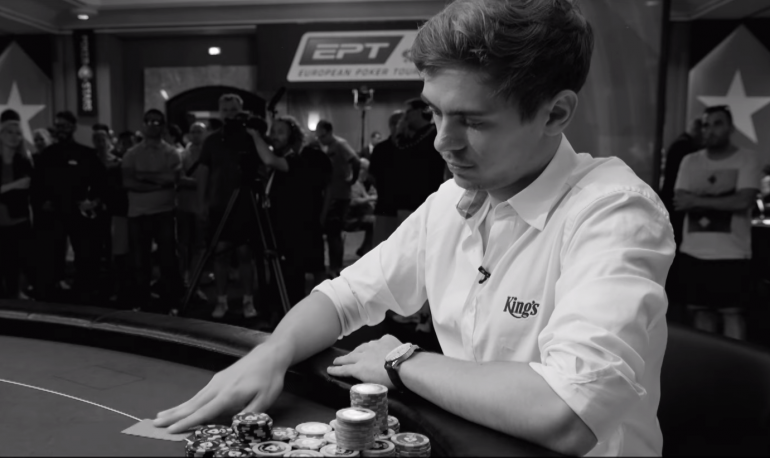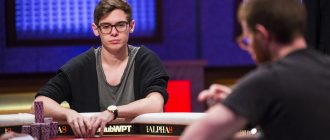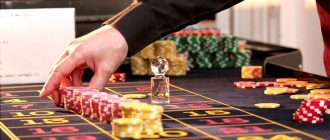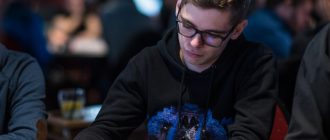Just imagine — a young man who has earned $32,556,377 in a couple of years of active career decides to retire. There may be several reasons for taking such a decision. He might be tired or just ready to take a break; preferably a long one! Or, he might have in mind something else: more exciting and probably less stressful and time-consuming than playing poker. But all these reasons should be worth refusal of such a brilliant, meteoric career, shouldn’t they?
If he had opted to continue climbing up and up the ladder of world poker at such a rate, or even a little slower, he could have gotten the 1st position on the All Time Money List in just a couple of years. He could have continued to play in live tournaments, winning WSOP bracelets every year, crushing the tables of the most prestigious high-roller poker tournaments as he did at the 2016 World Series of Poker. With his talent and skills, as well as the ability to take advantage of his young age, his poker future might have seemed to be bright, completely bereft of any serious obstacles or difficulties. But he refused to take it. Why? Or, more exactly, what did he do it for?
Table of Contents
Possible Reason #1: Emotional Burnout?
One possible reason for quitting poker could be burnout. Every poker player knows how stressful this game can be. The costs of emotions and energy spent can sometimes be higher than the money earned — if such things are, of course, comparable. But poker players still have to compare them. And, at some moment, it could become too hard for an emotionally exhausted player to cope with poker; especially with high stakes.
But Fedor Holz is well-known for his profound mindset practices and self-control techniques. Although many poker players pay attention to self-control issues, none of them have ever founded a company for priming other people’s minds to help them to achieve their life goals. This is what Fedor did — perhaps because he was good enough at learning to cope with these mindset issues. The primed mind of CrownUpGuy is supposed to able to withstand the huge weight of stress that inevitably results from playing poker. Indeed, he was actually getting along quite nicely, with no signs of burnout.
However, this is precisely what Fedor Holz once said about being emotionally exhausted and at the same time having to keep on walking without showing weakness. Or even a sign of being drained! This means that the constant poker grind was a tough challenge, even for CrownUpGuy!
Possible Reason #2: Something Else in Mind?
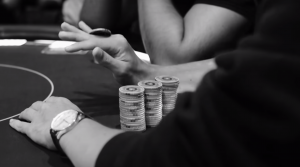 Yes, he does have plans. In fact, he seems to have a lot on his mind these days. Fedor Holz has already launched a couple of up-and-coming startups. We have already mentioned Primed Mind — the purpose of this is simply to prime people’s minds to make them more successful in life; as well in poker, if they play it! And then there’s No Limit Gaming — which is intended to bring poker and e-sports together or to airdrop a courageous squad of outstanding poker players onto the promising territory of e-sports. There are a few more projects originating from his Vienna startup incubator. Fedor said quite candidly that he was going to be on a startup grind from here on in!
Yes, he does have plans. In fact, he seems to have a lot on his mind these days. Fedor Holz has already launched a couple of up-and-coming startups. We have already mentioned Primed Mind — the purpose of this is simply to prime people’s minds to make them more successful in life; as well in poker, if they play it! And then there’s No Limit Gaming — which is intended to bring poker and e-sports together or to airdrop a courageous squad of outstanding poker players onto the promising territory of e-sports. There are a few more projects originating from his Vienna startup incubator. Fedor said quite candidly that he was going to be on a startup grind from here on in!
Do all these projects need more time and attention than a professional poker player on a tournament grind might afford? Certainly, yes. Will these business initiatives generate more money than Fedor’s poker career? Hard to say. If so, then maybe only in the long run. But if this is so, then why to quit poker to concentrate on these startups?
There are already some examples of successful poker players who have quit the game and tried to develop businesses; although the results have not always been equally impressive. But doing business still seems to be less risky than playing poker, and a desire to keep your earnings away from the poker table doesn’t require any further explanation now, does it?
Still: Fedor’s interviews and behavior, in general, don’t really make him look like the kind of guy who just wants to protect his money and to invest in businesses. He wants these businesses! He thought them through well, having a hope that one day he would dedicate enough time and efforts to develop them. Fedor believes in what he does, and he wants to succeed in it; no less than he wants to become successful in poker.
Then was it a kind of tough choice for a young man who wanted too much at once? Perhaps not. As Fedor explained his priorities, he played poker to gain financial independence. Once a decent amount of money is accumulated, he would finally be able to do other things in life. “To grow and develop,” as he says.
Possible Reason #3: Just Had Enough of It?
Whatever people do in life, they often come to a point when they feel they are already fed up. It usually happens when they do something for fun, for money or just for living, or because they decided they have to do it for some reason or another. But when people love what they do, then they’re hardly likely to ever reach this point, are they? Because they will just never have enough. And it seems this is exactly the case with Fedor Holz. He just loves poker!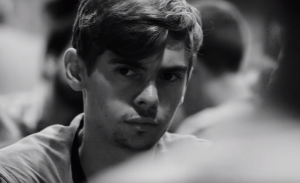
You should see his face when he is playing. Note the expression of his face and inner radiance of his eyes. He is happy. And not because he is winning — he does not win all the time, as we know. He loves poker, so he is engaged in teaching and backing players. And probably that is why he has never fully retired from poker; and perhaps it is also why he is never really going to get bored of it!
Other Possible Reasons
Fedor is an idealist, in the very best sense of the word. This conclusion can be drawn from his charitable activities — in particular, for homeless children in Chile. And also from his interviews as well! He wants to make an impact and to leave an imprint. Any pursuits of his other than poker are attractive to him, not because they are potentially profitable, but because they are just delightful and useful, and it would be a pity to miss out on doing some good in the world!
Besides, Fedor considers poker to be rather selfish, by its very nature. And he wants to balance what he has taken with what he could give. Such reasoning sounds very positive! But not only that: it also leads us to expect some extraordinary outcomes from Fedor’s post-poker initiatives, doesn’t it? They are definitely not going to be distilled into just another couple of showcased success stories of some mundane, business development or another.
Poker Career of a “Retired” Poker Player
The list of Fedor Holz poker “post-retirement” achievements is still quite impressive. For example, he finished 2nd at Pot-Limit Omaha $2,100 buy-in SCOOP tournament, which was really tough — even though he is more known as a specialist in No-Limit Hold’em poker. He enjoyed wins in many other events, winning millions of dollars since his “retirement” in 2016.Finally, Fedor Holz’s net worth is more than impressive.
So, did he really retire? Having won WSOP Main Event — $111,111 One Drop High Roller tournament — and earning $4,981,775 for the victory in 2016, Fedor Holz announced his retirement from poker, which was widely discussed in poker news. But he still plays, appearing here and there at high-roller events. At least, that is what Fedor Holz promised — not to quit completely. Because, as we know, he is just fond of poker.
FAQ About Fedor Holz Post-Poker Life
Does Fedor Holz still play poker?
After his retirement from poker, Fedor Holz still plays this game, but not as much as before. According to his estimates, now it is about 5% of what it used to be. Before he became a “retired person,” which may sound a bit weird for a young man still under 30, he had been on the grind all the time. He spent most days doing poker-related activities. Whereas “5%” could mean just playing poker once or twice a week with his friends — for his own pleasure, and to help him stop his skills from deteriorating. Besides, he does still show up at some important tournaments; but only occasionally.
Does Fedor Holz miss playing poker as a professional grinder?
Knowing his temper, one can assume that yes, he misses professional poker — just because he likes this game and has always enjoyed it. Or as Fedor himself once said, he developed his “I belong here” feeling when he had been playing a lot — which definitely was one of the key success factors in his poker career. This feeling never fades away! And that’s why he must be missing his old poker grind times. It is very unlikely that he would ever leave the game completely.
But this “retirement” of his was still a brave and well-considered decision. Fedor realized that the life of a poker professional takes away too much energy. So his decision was to quit the activity he really appreciated in order to concentrate on doing what he liked even more. A tough choice for a young man who enjoys perhaps too many things, wasn’t it? But he made it anyway.
What is the background of Fedor Holz’s Primed Mind initiative?
Fedor Holz firmly believes that mindset practices have had a decisive contribution to his success. Even though he had a very high IQ of 155 (genius or close to it), when he was still a child, this indeed outstanding brain capacity had to be effectively translated into doing practical things — namely, in great poker winnings. And mindset practices were exactly the key. Having realized how powerful was the tool he had access to, Fedor decided to share this experience and to make it available for many people.
His Primed Mind initiative offers immersive mindset training sessions with his former coach, Elliot Roe. This largely expanded Elliot’s exposure and his methods are widely known and appreciated.
Is mindset training program focused only on poker?
No, it is not. These practices really enhance the capacity of the human mind. The positive effect of the training has already been appreciated by a large number of people doing different things in life.
What is the difference between “poker grind” and “startup grind”?
As Fedor says, he has switched from poker grind to startup grind, which means that he is fully concentrating on the development of his startup projects. While there are many obvious differences between being a professional poker player and a startup businessman, Fedor still finds many similarities. Of course, the agenda and the surroundings are not the same. However, the important thing in common is the need to:
- take into account many factors; some of which have opposite effects
- handle many uncertainties and probabilities at once
- make optimal decisions when there is no “full picture”
- deal with many people trying to figure out what they would do
Fedor, by nature, likes to handle large volumes of information and to focus on what is really essential. Perhaps it is this attitude that has already made him a successful poker professional. It’s probably going to make him a successful startup businessman too.

